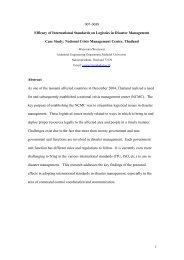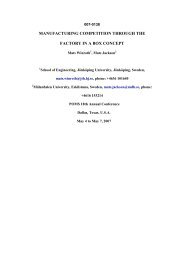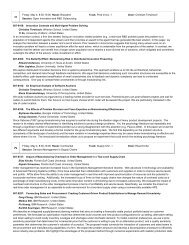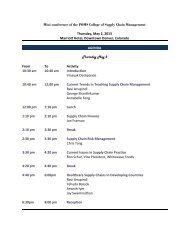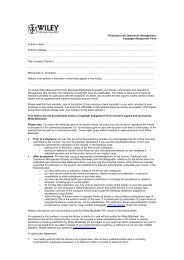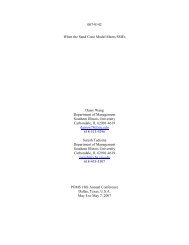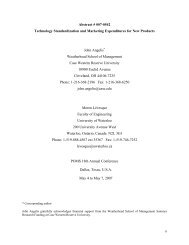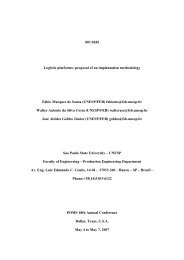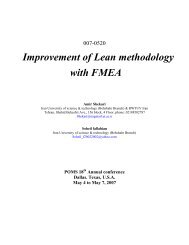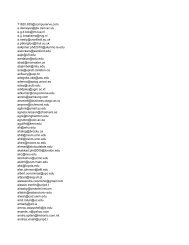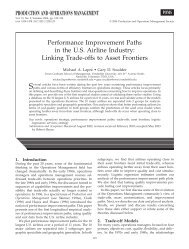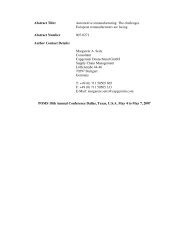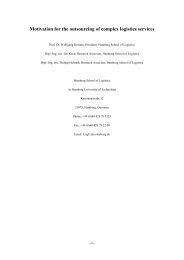Syllabus - Faculty Websites
Syllabus - Faculty Websites
Syllabus - Faculty Websites
Create successful ePaper yourself
Turn your PDF publications into a flip-book with our unique Google optimized e-Paper software.
OPRE 6377 Demand and Revenue Management - <strong>Syllabus</strong><br />
Course Information<br />
• Course number - section: OPRE 6377 - 501. Course title - term: Demand and Revenue Management - Fall 2012<br />
Professor and Teaching Assistant Contact Information<br />
• Professor: Metin Çakanyıldırım , metin@utdallas.edu , SOM3.408.<br />
Lecture hours: 7-9:45 pm on M at SOM2.804.<br />
Office hours: 5:00-6:00 pm on M and Tu at SOM3.408.<br />
• Teaching Assistant: Emre Ertan , iee061000@utdallas.edu , SOM3.224.<br />
Office hours: 5-7 pm on M at SOM3.224.<br />
Course Description<br />
Conceptual: Management is about matching demand and supply. This course focuses on the demand without<br />
attempting to manage the supply. But it does take the amount, location, condition, or vintage of the supplies<br />
into account. Demand must be understood first to be managed. This understanding comes partly from statistical<br />
forecasting but more importantly from the identification of the demand drivers. These drivers are specific to<br />
industries but some are common and easily obtainable such as general macroeconomic indicators, demographic<br />
data, housing inventories, and temperatures. Unlike these demand drivers, prices can be managed over time,<br />
customer classes, locations. A good portion of the course is dedicated to determining good prices depending on<br />
inventory, capacity, input costs, and previous prices 1 .<br />
Practical: Revenue management (RM) first emerged in US airline industry after the deregulation in 1980s. It has<br />
successfully implemented by companies in air transportation, hospitality (hotels, cruises, theme parks, casinos),<br />
car rental, media, broadcasting, natural-gas storage and transmission, electricity generation and transmission,<br />
show business (concerts, theaters, sport events), universities. Most applications are recent and made possible<br />
by the advances in technology, information systems, and data mining. However, there are issues of legality and<br />
customer backlash for charging different prices for virtually the same product. The course will touch upon these<br />
issues as well.<br />
Course Objectives<br />
Students will<br />
• be able to list and relate demand drivers to demands in specific industries,<br />
• be able to derive and compute price-demand relationship, optimal prices and revenues,<br />
• be aware of revenue management practices.<br />
Course Pre-requisites and Related Courses<br />
• Pre-requisites: OPRE 6302 and exposure to probability, or consent of the instructor.<br />
Knowledge (not expertise) of equation solving, derivatives and integrals of polynomials, and expectation.<br />
Familiarity with linear programming formulations. Read MBA math review 1-2 under the “Supplements”<br />
section of the course web site.<br />
• Math refresher: UTD has a math refresher course that can help you remember what you learnt in a calculus<br />
course. The math refresher should always be available online; to test whether you need this course, see<br />
http://som.utdallas.edu/somResources/eLearning/eLearningCurrent/math.php.<br />
1 This dependence distinguishes this course from a standard marketing course.<br />
1
• Related courses:<br />
– OPRE 6368: Supply Chain Software by Prof. Gene Deluke in Summers.<br />
– OPRE 6370: Logistics and Distribution by Prof. Alp Muharremoglu.<br />
– OPRE 6371: Purchasing and Sourcing Management by Prof. Elena Katok.<br />
– OPRE 6335: Risk and Decision Analysis by Prof. Alain Bensoussan.<br />
– OPRE 6371: Information Enabled Supply Chains by Prof. Ozalp Ozer.<br />
– OPRE 6364: QC: Lean Six Sigma by Prof. Divakar Rajamani.<br />
– OPRE 6366: Supply Chain Management by Prof. Metin Çakanyıldırım in Falls.<br />
– OPRE 63??: Managing Energy: Risk, Investment, Technology by Prof. Metin Çakanyıldırım in Springs.<br />
– OPRE 6366 Online: Supply Chain Management by Prof. Metin Çakanyıldırım in Springs.<br />
Required Textbooks and Materials<br />
• Textbook: Pricing and Revenue Optimization. By Robert L. Phillips. First edition published by Stanford<br />
University Press, 2005. ISBN 0-8047-4698-2. Costs $50.60 per copy.<br />
• Linear/Integer Programming Notes: Students are expected to know how to formulate a linear/integer<br />
program. This subject is discussed in OPRE 6302. To refresh that discussion and see more formulation<br />
examples, students are advised to study the “Formulation”, “Transportation” (pp. 1-4) and “Location”<br />
course notes under the “Supplements” section of the course web site.<br />
Suggested Course Material<br />
• Supplementary articles in journals accessible by UTD community. OR (Operations Research), MS (Management<br />
Science), TS (Transportation Science), MSOM (Manufacturing and Service Operations Management)<br />
and others.<br />
– A Taxonomy and Research Overview of Perishable-Asset Revenue Management: Overbooking, Yield Management<br />
and Pricing by L. Weatherford and S. Bodily, OR, vol.40, 1992.<br />
– Revenue Management: Research Overview and Prospects by J. McGill and G. van Ryzin, TS, vol.33, 1999.<br />
– An Overview of Pricing Models for Revenue Management by G. Bitran and R. Caldentey, MSOM, vol.5,<br />
2003.<br />
– Dynamic Pricing in the Presence of Inventory Considerations: Research Overview, Current Practices, and<br />
Future Directions by W. Elmaghraby and P. Keskinocak. MS, vol.49, 2003.<br />
– Revenue Management and E-commerce by A. Boyd and I. Bilegan, MS, vol.49, 2003.<br />
• Supplementary books:<br />
– Data Analysis for Managers by Christian Albright, Wayne Winston and Christopher J. Zappe. Second<br />
edition by Duxbury, 2004. ISBN 0-534-39721-2. Forecasting in Part 4 is useful. But there are many<br />
similar books with titles such as Managerial Statistics, Spreadsheet Modelling, Quantitative Analysis.<br />
– The Theory and Practice of Revenue Management by Kalyan T. Talluri and Garrett J. van Ryzin. First<br />
edition published by Kluwer Academic Publishers, 2004. ISBN 1-4020-7701-7. The book is a mixture<br />
of theory and practice. The theory is closer to the PhD level than MBA/Master level. The practice (in<br />
chapters 1, 10-11) is fun to read.<br />
– Yield Management: Strategies for the Service Industries by A. Ingold, I. Yeoman and U. McMohan.<br />
– Revenue Management and Pricing: Case Studies and Applications by I. Yeoman and U. McMohan-Beattie.<br />
– Revenue Management Hard Core Tactics for Market Domination by R. G. Cross.<br />
– Future of Pricing: How Airline Ticket Pricing Has Inspired A Revolution by A. Body.<br />
2
Assignments & Grading Policy<br />
• Classes start on Aug 27. Students are advised to attend the classes.<br />
• Grading<br />
– 5% for Class attendance and contribution to discussion. Please bring your nametags to the class.<br />
– 25% * Homeworks: There will be 4-5 homeworks. You may discuss homework problems with others,<br />
but you must write up by yourself with the full understanding of what you write. Students handing in<br />
identical assignments will be violating university regulations and will not receive credit! Late homeworks<br />
are not allowed unless you negotiate with the TA at least one day in advance. Your minimum<br />
homework grade will be dropped from consideration.<br />
– 20% * Quiz 1. October 15.<br />
– 20% * Quiz 2. November 26.<br />
– 30% * Project report (20%) due to November 26. Presentation (10%) on December 10.<br />
• During the quizes, any book/note/printed material can be used but not computers or cellular communication<br />
devices.<br />
• Overall grades will be curved by considering the current class average.<br />
• Students who score less than 50% of the first quiz grade must schedule an appointment with the instructor<br />
to discuss the possible ways to improve their performance.<br />
• In this course, you will be given +/- minus grades. For example, you may get an A- or B+ grade. Students<br />
earn a grade in this course by mastering the course material. Students are not graded based on any type of<br />
need, amount of effort, family, personal circumstances, or their previous record in other courses.<br />
UTD Resources<br />
• Practice Lecture Series: We expect to host 1-2 lectures in class. They will be on Revenue Management<br />
Practice and be given by practitioners from Dallas area companies. Lecture dates will be announced later<br />
on the course web site.<br />
• UTD has two centers relevant to this course. The centers perform interdisciplinary research and develop cooperation<br />
in risk management, supply chain management and decision-making by exchanging knowledge<br />
and experience among academia, industry, and public agencies. For more info:<br />
– Center for Intelligent Supply Networks (C4ISN) http://som.utdallas.edu/centers/c4isn/.<br />
– International Center for Decision and Risk Analysis (ICDRiA) http://som.utdallas.edu/centers/icdria.<br />
• E-Access to Journals via UTD Library: Library electronically subscribes to many journals such as Harvard<br />
Business Review, Management Science, which are of interest. To access such a journal go to the UTD<br />
Library web page. Click on “E-Journals”. You will see an alphabetical list of journals. Click on ”H” for<br />
”H”arvard Business Review. You will see that HBR is listed 15-20 from the top among the journals starting<br />
with letter ”H”. Click on HBR link, you will be transferred to EBSCO web site which keeps the journal. To<br />
access Interfaces journal, click on ”I” for ”I”nterfaces, and continue as before. To access from a non-UTD<br />
computer, you need UTD ID and password. Please respect the copyright laws.<br />
• Career Center: The SOM Career Center (http://som.utdallas.edu/somResources/somCareerCenter) provides<br />
the following services: Career Counseling, Resume Assistance, Interview Assistance, Job Search Assistance,<br />
Career Resource Library, Web Resume Database, On Campus Recruiting, Active Internship Program.<br />
3
Web Pages/Groups<br />
The course web page can be reached via www.utdallas.edu/ ∼ metin/teaching.html with the password ...................<br />
SCM-MS degree unofficial web page is www.utdallas.edu/ ∼ metin/SCM/scm-ms.html. UTDSCM Google Group<br />
web page is http://groups.google.com/group/utdscm. UTD SCM community communicates via a facebook<br />
personality named Utd Scm – become its friend to join the community.<br />
Informs Revenue Management and Pricing Section http://revenue-mgt.section.informs.org.<br />
Professional Pricing Society www.pricingsociety.com.<br />
Airline Group of the International Federation of Operational Research Societies (AGIFORS) www.agifors.org.<br />
Regional demand and other data www.dallasfed.org/data/index.html.<br />
Revenue Management Solution Developers<br />
This is an incomplete list. Solution development/software industry is very dynamic. I can add more companies<br />
to this list, if you tell me about them.<br />
Sabre Inc. www.sabre.com. JDA Software Group www.jda.com. PROS Revenue Management www.prospricing.<br />
com. Veritec Solutions www.veritecsolutions.com. KSS revenue management solutions www.kssg.com. Rubicon<br />
group www.therubicongroup.com. Zilliant www.zilliant.com. RTS www.rtscorp.com. Micros www.micros.com.<br />
Academic Integrity<br />
The University of Texas System and The University of Texas at Dallas have rules and regulations for the<br />
orderly and efficient conduct of their business. It is the responsibility of each student and each student organization<br />
to be knowledgeable about the rules and regulations which govern student conduct and activities. The<br />
University of Texas at Dallas administers student discipline within the procedures of recognized and established<br />
due process. Procedures are defined and described in the Rules and Regulations of the Board of Regents of the<br />
University of Texas System, Part 1, Chapter VI, Section 3, and in Title V, Rules on Student Services and Activities<br />
of the Course <strong>Syllabus</strong> Page 8, University’s Handbook of Operating Procedures. Copies of these rules and regulations<br />
are available to students in the Office of the Dean of Students, where staff members are available to assist<br />
students in interpreting the rules and regulations (SSB 4.400, 972.883.6391). A student at the university neither<br />
loses the rights nor escapes the responsibilities of citizenship. He or she is expected to obey federal, state, and<br />
local laws as well as the Regents’ Rules, university regulations, and administrative rules. Students are subject to<br />
discipline for violating the standards of conduct whether such conduct takes place on or off campus, or whether<br />
civil or criminal penalties are also imposed for such conduct.<br />
The faculty and administration of the School of Management expect from our students a high level of responsibility<br />
and academic honesty. Because the value of an academic degree depends upon the absolute integrity<br />
of the work done by the student for that degree, it is imperative that a student demonstrate a high standard<br />
of individual honor in his or her scholastic work. We want to establish a reputation for the honorable<br />
behavior of our graduates, which extends throughout their careers. Both your individual reputation and the<br />
school’s reputation matter to your success. The Judicial Affairs website lists examples of academic dishonesty:<br />
http://www.utdallas.edu/judicialaffairs/UTDJudicialAffairs-Basicexamples.html.<br />
Plagiarism on written assignments, especially from the web, from portions of papers for other classes, and<br />
from any other source is unacceptable. On written assignments, this course can use the resources of https://<br />
turnitin.com, which searches the web for plagiarized content and is over 90% effective.<br />
During tests/quizzes, students in this section are not allowed to use any electronic devices, including IPads,<br />
IPhones, IPods, MP3 Players, earphones, radios, smart phones, cameras, multi-function timepieces or computers.<br />
When possible, students should sit in alternating seats, face forward at all times, and remove any clothing<br />
which might conceal eye movements, reflect images of another’s work. Exam proctors will monitor any communication/signaling<br />
between students by talking, whispering, making sounds or by using your hands, feet, other<br />
body movements, the test paper itself or your writing implement.<br />
4
TENTATIVE COURSE TIMELINE<br />
1. Week - Aug27. DEMAND MANAGEMENT<br />
(a) Ch2: Introduction to pricing and revenue optimization.<br />
Week of Sep03. Labor Day Holiday<br />
2. Week - Sep10<br />
(a) Ch3. Demand functions and price optimization: Price-response function; Competition.<br />
(b) Case study: Car rental.<br />
3. Week - Sep17.<br />
i. Evolutionary Change in Product Management: Experiences in the Car Rental Industry. W.J. Carroll and R. C.<br />
Grimes. Sep-Oct 1995. Interfaces, Vol 25: 84-104.<br />
ii. Revenue Management Saves National Car Rental. M.K. Geraghty and E. Johnson. Jan-Feb 1997. Interfaces,<br />
Vol.27: 107-127.<br />
iii. Game: Universal Car rental Game.<br />
(a) Price-response estimation.<br />
(b) Case study: Forecasting Sales in the HVAC (Heating, Ventilating, Air Conditioning) Industry.<br />
4. Week - Sep24.<br />
(a) Ch4: Price differentiation: Volume discounts; Arbitrage and cannibalization; Consumer welfare.<br />
5. Week - Oct01.<br />
(a) Ch5: Constrained supply: Opportunity cost; Segmentation; Variable pricing.<br />
6. Week - Oct08. REVENUE MANAGEMENT<br />
(a) Ch6: Revenue Management.<br />
7. Week - Oct15. Quiz 1.<br />
8. Week - Oct22.<br />
(a) Ch7: Capacity Allocation.<br />
9. Week - Oct29.<br />
(a) Ch8: Network Management.<br />
10. Week - Nov05.<br />
(a) Ch9: Overbooking.<br />
(b) Case study: Carnival Cruise Lines.<br />
11. Week - Nov12. OTHER PRICING CONTEXTS<br />
(a) Ch10: Markdown Pricing.<br />
Week of Nov19 Fall break and Thanksgiving holiday.<br />
12. Week - Nov26. Quiz 2.<br />
13. Week - Dec03.<br />
(a) Ch11: Customized Pricing: List prices vs. customized prices; Responses to competitor bids.<br />
(b) Case study: Electricity prices in deregulated markets.<br />
14. Week - Dec10: Project presentations.<br />
5



